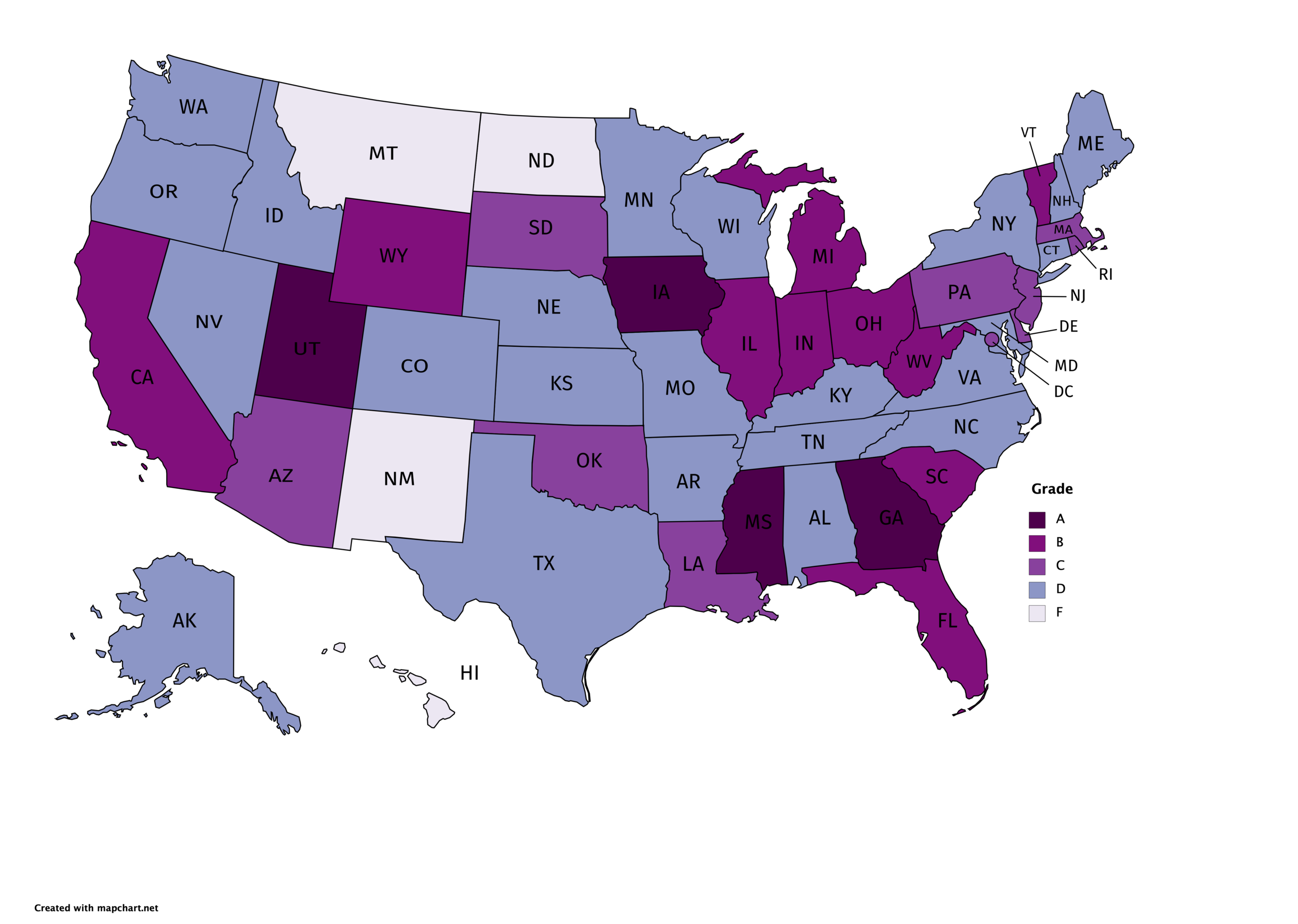US State COVID-19 Report Card: August Update
Map current as of 8/31/20
Author: Capri D’Souza
Following the initial release of the GenderSci Lab’s Health Affairs Blog, Socially Relevant Variables in US State COVID-19 Surveillance Reporting: A Report Card, at the end of June, the lab has continued to track changes in state reporting of socially relevant variables for COVID-19 cases and fatalities. Data availability is becoming increasingly critical as many states experience a second wave of infections. By monitoring the comprehensiveness of COVID-19 data reporting across the US, we are continuing to build a picture of what data are available, and where this data can be found. Only once socially relevant variables and their interactions are analyzed can COVID outcomes and their disparities are placed within their social context, as highlighted in our June previous Report Card blog post. It is of paramount importance that states continue to be held to a high standard of accountability for their data reporting.
The full data tables for this Report Card, and prior versions going back to April, are hosted on our US State COVID-19 Report Card page. Data will continue to be updated monthly, with primary data hosting on the site and a highlights blog emphasizing important shifts. Previous month’s highlights blogs are available below this post.
Our August Report Card highlights some interesting changes to data reporting. Overall, state grades remain low, and some states have stopped reporting important variables. Other states continue to increase variables reported, including a dramatic rise in score for West Virginia.
Overall, the average grade for states increased slightly from 6.60 to 6.70, which still represents a D. A “D” grade indicates that out of the 10 variables that we collect data on, the average state is reporting only 6 variables. We note that the national average grade has been a D since when we began our data reporting in June, and thus reporting is still dangerously inadequate.
Most concerningly this month, Alabama and the District of Columbia saw a decrease in data reporting. Alabama eliminated its reporting of comorbidities and interactions among death data and the District of Columbia failed to report interactions among death data. In positive news, West Virginia, saw a drastic 4-point increase in its grade and received a B after adding reporting for age, gender, race/ethnicity, and interactions among fatalities in August. Hawaii and South Carolina also rose by 2 points, though Hawaii still reports very little data and has a failing grade overall.
The variable most likely to be newly reported in August was sex, with New Hampshire and West Virginia beginning to report sex-disaggregated fatality data and Hawaii adding reporting for cases. With Hawaii’s addition, sex among cases is now being reported in all 50 states. New York and North Dakota remain the only two states that are not reporting race/ethnicity among cases.
Our August update shows that changes in data reporting at the state level are still possible and are a vital step towards fully understanding health inequities that exist among COVID-19 cases and outcomes. Our monthly updates should serve as an urgent call to action for all states to continue to develop and improve their reporting of socially relevant variables and COVID-19.
Highlights from August’s Report Card
From July to August, the average grade for states has increased from 6.60 to 6.70. However, this still represents an average of a D grade.
Hawaii and South Carolina both saw a score increase of 2.
West Virginia saw a dramatic score increase of 4, moving from an F to a B grade.
Alabama and the District of Columbia saw their score decrease.
Two states (West Virginia, New Hampshire) have started reporting gender for fatalities.
One state (West Virginia) has started reporting race for fatalities.
Source: Authors’ analysis of State Health Department websites, as described in Boulicault et al. 2020
Prior Report Card blog posts
Original June 2020 Report Card and Health Affairs Blog Post
RECOMMENDED CITATION
Capri D’Souza. “US State COVID-19 Report Card: August Update ” GenderSci Blog, September 22, 2020. https://www.genderscilab.org/blog/us-state-covid-19-report-card-august-update.
CONTACT
For media and other inquiries concerning the Data Report Card, please contact Marion Boulicault at marionb@mit.edu.
For questions about the GenderSci Lab COVID Project or to collaborate, contact us at genderscilab@fas.harvard.edu.
STATEMENT OF INTELLECTUAL LABOR
D’Souza wrote the blog post. Tarrant wrote the highlights. Shattuck-Heidorn provided edits. D’Souza, Tarrant, and Jillson collected and validated the data.


